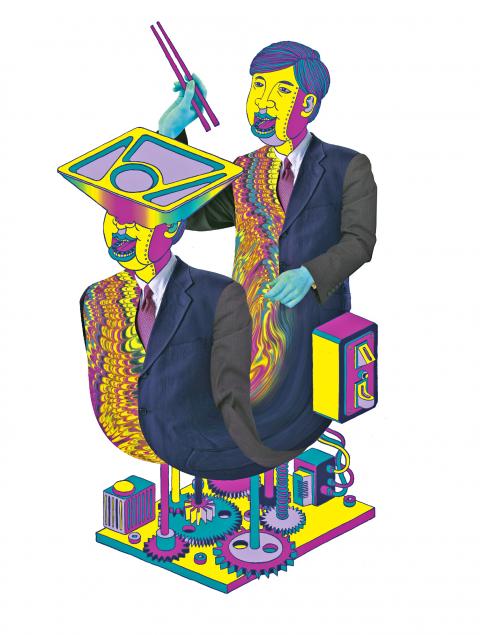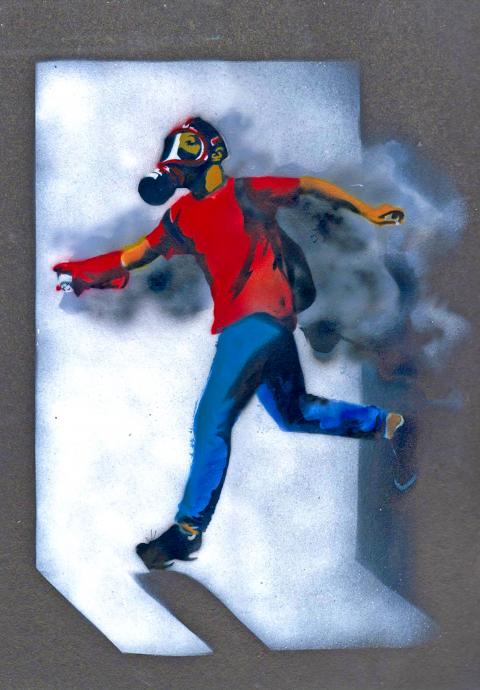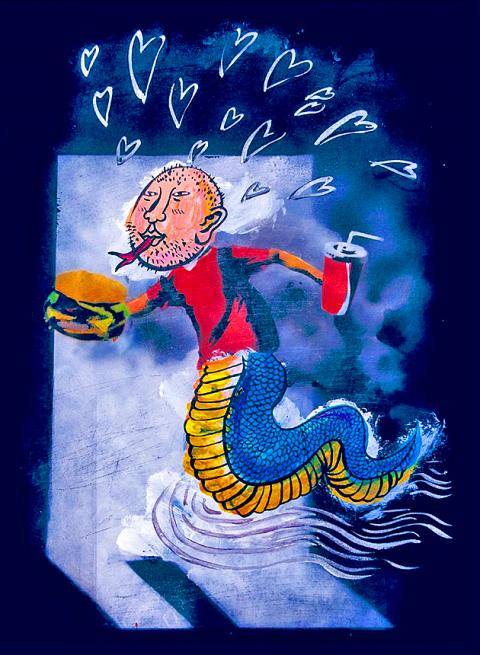“Taiwanese media’s biggest problem isn’t that it’s crap, but that it has no power of imagination,” said Edd Jhong (鐘聖雄), one of the founders of Decode Magazine (眉角雜誌). “I want to see a magazine that explodes with pulp, makes you wet your pants. Something that has got balls the size of a bull, something that’s new and fun.”
Decode is certainly something new for Taiwan’s media market. At just its third issue, the Chinese-language publication has become Taiwan’s most highly sought after independent magazine. Its first issue, dedicated to the occupy protest movements gaining popularity around the globe, sold out its first print run of 3,500 in mere days, requiring a second printing of 700.
Its aim is to give readers the tools to ‘decode’ the complex events happening around them, and offers an in-depth and multi-angled approach as an answer to criticism of Taiwan’s poor quality news culture.

Photo courtesy of Godkidlla
But Taiwan’s most in-demand magazine can’t be found online. It’s only on sale at independent bookstores and coffee shops, and through a subscription purchased from a crowdfunding Web site.
This makes Decode hard to categorize. It is part of the new wave of online media news sites that have gained popularity after the Sunflower movement — the civil protest that broke out in March last year in opposition to the Chinese Nationalist Party (KMT)-dominated legislature’s ramming through a controversial cross-strait service trade agreement — but it is firmly entrenched in the world of the printed page, hoping to revive an era where eye-catching photography and design motivates readers to pluck out the cash to hold it in their own hands.
“Our biggest challenge is that people are already so used to free content. How many people are willing to buy and subscribe to newspapers and magazines since the dawn of Internet news?” said Liu Mei-yu (劉美妤), another Decode founder.

Photo courtesy of Godkidlla
Perhaps it’s still too early to write the obituary for Taiwan’s troubled printed news industry. Maybe all it needs is a new model to excite readers.
CONTENT IS KING
Staring intently into their computer screens, the magazine’s founders only look up as I begin to approach their table. We’ve arranged to meet at Sugarman Cafe, a coffee shop with posters of various social movements and protests past and present plastered all over the front door and bulletin board.

Photo courtesy of Godkidlla
Tucked into a booth in the far corner of the cafe, Jhong, Liu and Huang Yi-yuan (黃驛淵) are all busily working on the magazines’ next issue, about Taiwan’s “loser” culture.
“Our model for how we define a successful person is so narrow,” says Jhong. “We only see success as making a lot of money, and owning a house and car.”
Their choice to look at loser culture exemplifies its fun approach to delving into the deeper issues that affect Taiwanese society. What at first may seem like a vacuous theme to explore, later appears as a pithy and clever way to explain Taiwan’s obsession with consumerism and home ownership.
“If you’re single, make 30K a month, but you’re happy, nobody sees that as success. We see that person as a loser,” Liu says.
Decode can be seen as an answer to Taiwan’s schizophrenic news industry that offers a multitude of choice, but rarely provides meaningful analysis, or connects news events to larger trends occurring in Taiwan and around the globe.
“The problem with Taiwan’s media was so evident during the Sunflower movement,” said Jhong, an award-winning photo-journalist. “There were thousands of news stories about it, but no one had any idea what was really going on, or why the students were protesting.”
Jhong proposed the idea for Decode to Liu, a former New York Times reporter, and former United Daily News reporter Huang, who both liked the idea of an alternative news magazine in the vein of alternative ‘zines’ like Colors and Vice.
After covering the occupy movement and its link to Taiwan’s Sunflower movement in their first issue, they decided to carry out an “ethnography” of the Taiwanese dinner table, and looked at how cultural background, and the media’s perception of food safety and cuisine, affect our food choices. Both issues sold like hot cakes.
Decode’s popularity can be seen as part of the new and expanding media landscape that was formerly dominated by traditional media outlets the Apple Daily and the Liberty Times (the Taipei Times’ sister newspaper).
Online news Web sites like Taiwan’s Storm Media (風傳媒), Bacon Press (五花鹽), the Initium (端傳媒) and the highly anticipated news site The Reporter (報導者), by veteran writer and journalist Chang Tie-chi (張鐵志), have re-energized Taiwan’s media scene, providing more diversity and attracting thousands of new readers.
But Decode is very different from the explosion of new media Web sites in an important way. It has purposefully chosen to keep all of its content offline, hoping to engross its readers in content on the printed page, and away from the distractions of the smartphone screen.
A NON-LINE STRATEGY
As media outlets around the world clamber aboard the Internet as the great hope to survive shrinking circulation and boost advertisement sales, it may seem odd that Decode would choose a non-line strategy that focuses on the printed page.
News corporations like Next Media (壹傳媒) have been able to reap enormous profits through their aggressive online strategies, but it has come at the cost of over-dependence on tacky web ads that flood your screen and click-bait headlines with minimal content.
Decode’s creators see the media’s over-dependence on advertising to plug falling subscription numbers as part of the problem, not the solution.
“We’ve grown so used to advertisers footing the bill for our media, but that comes at a cost,” says Liu. “If you don’t want your editorial content to be taken hostage by advertisers, then you have to ask your readers to pay for good content.”
In order to have complete control of their content, and keep their magazine ad-free, they turned to local crowdsourcing platform SOSreader to raise the initial capital for the magazine.
Based on Jhong, Liu and Huang’s reputation within the independent journalism community, and the striking initial design layout sketches provided by lead designer Godkidlla (小子), Decode was able to raise an astounding NT$5 million for their first six-issue run.
Readers who subscribe to the magazine through a crowdfunding Web site receive the magazine by mail. It is available for purchase at independent bookshops and coffeeshops around Taiwan, but often sells out days of its announced sale date.
“A friend of mine told me that when Decode sold out in Taipei, he went all the way to Hualien to pick up the issue,” Jhong said.
Most important for Decode is to create a direct relationship with their readers, whereby they produce good content, readers pay the writers and editors directly for their work, and then are able to continue to make a good product.
“The attitude that people have in Taiwan is that news is free, so it becomes disposable. We want you to spend money on what we’ve produced, so you value it and enjoy it,” Huang says.
“If traditional media just shifts its old content to the Internet, the concept of new media doesn’t make any kind of breakthrough and is still stuck making vacuous content,” he adds.
Perhaps the greatest innovation in the rise of Taiwan’s new media isn’t digitalization, but giving readers a substantive and thoughtful way to think about their news.
For a full list of locations where Decode is sold, visit www.facebook.com/powertoimagination. The magazine’s third issue on “losers” is available now.

Google unveiled an artificial intelligence tool Wednesday that its scientists said would help unravel the mysteries of the human genome — and could one day lead to new treatments for diseases. The deep learning model AlphaGenome was hailed by outside researchers as a “breakthrough” that would let scientists study and even simulate the roots of difficult-to-treat genetic diseases. While the first complete map of the human genome in 2003 “gave us the book of life, reading it remained a challenge,” Pushmeet Kohli, vice president of research at Google DeepMind, told journalists. “We have the text,” he said, which is a sequence of

On a harsh winter afternoon last month, 2,000 protesters marched and chanted slogans such as “CCP out” and “Korea for Koreans” in Seoul’s popular Gangnam District. Participants — mostly students — wore caps printed with the Chinese characters for “exterminate communism” (滅共) and held banners reading “Heaven will destroy the Chinese Communist Party” (天滅中共). During the march, Park Jun-young, the leader of the protest organizer “Free University,” a conservative youth movement, who was on a hunger strike, collapsed after delivering a speech in sub-zero temperatures and was later hospitalized. Several protesters shaved their heads at the end of the demonstration. A

Every now and then, even hardcore hikers like to sleep in, leave the heavy gear at home and just enjoy a relaxed half-day stroll in the mountains: no cold, no steep uphills, no pressure to walk a certain distance in a day. In the winter, the mild climate and lower elevations of the forests in Taiwan’s far south offer a number of easy escapes like this. A prime example is the river above Mudan Reservoir (牡丹水庫): with shallow water, gentle current, abundant wildlife and a complete lack of tourists, this walk is accessible to nearly everyone but still feels quite remote.

In August of 1949 American journalist Darrell Berrigan toured occupied Formosa and on Aug. 13 published “Should We Grab Formosa?” in the Saturday Evening Post. Berrigan, cataloguing the numerous horrors of corruption and looting the occupying Republic of China (ROC) was inflicting on the locals, advocated outright annexation of Taiwan by the US. He contended the islanders would welcome that. Berrigan also observed that the islanders were planning another revolt, and wrote of their “island nationalism.” The US position on Taiwan was well known there, and islanders, he said, had told him of US official statements that Taiwan had not